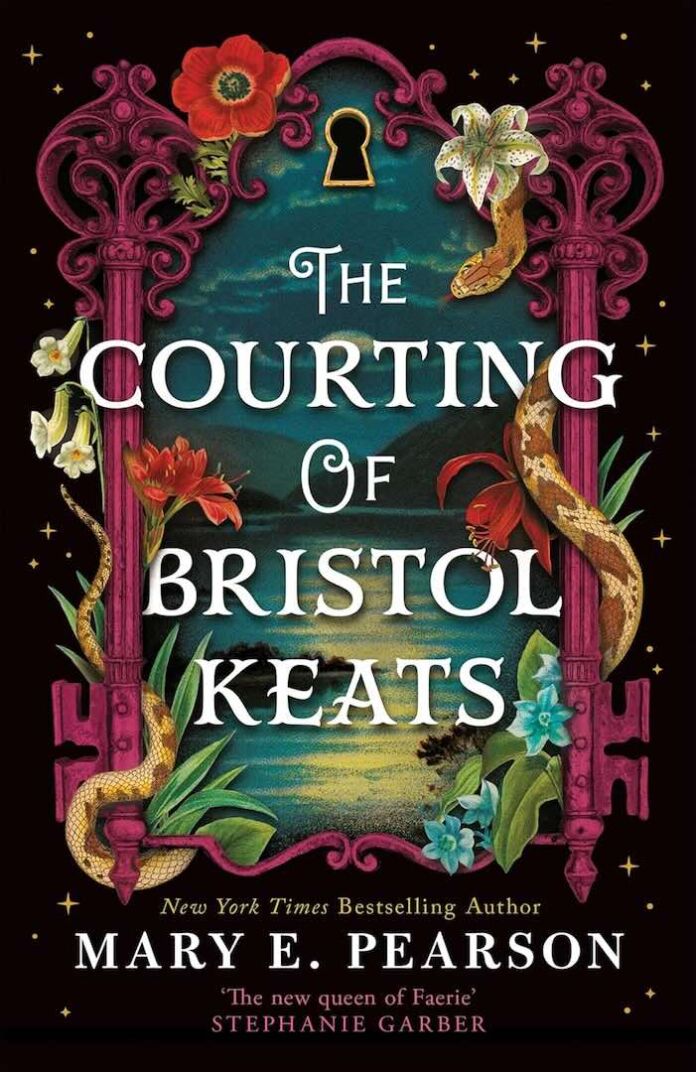Mary E. Pearson, acclaimed author of The Remnant Chronicles and The Dance of Thieves series, returns with a captivating new duology that proves she hasn’t lost her touch in crafting immersive fantasy worlds filled with complex characters and heart-wrenching romance. The Courting of Bristol Keats introduces readers to a richly imagined world where the boundaries between our reality and the realm of the fae are thinner than we think.
The Story
In the quiet town of Bowskeep, Bristol Keats and her sisters—Cat and Harper—struggle to maintain some semblance of normalcy after losing both their parents. Bristol works as a pizza delivery girl, using her uncanny ability to navigate the town’s streets to keep their family afloat. When mysterious letters arrive from an unknown “aunt” promising help, Bristol’s world turns upside down as she discovers her entire life has been built on carefully constructed lies.
Her father, Logan Keats, might not be dead after all but kidnapped by creatures called trows to a realm known as Elphame. Desperate to find him and uncover the truth about her family, Bristol strikes a bargain with the fae king Tyghan – not knowing he’s the very reason her parents spent their lives running.
Character Development
Pearson excels at crafting multifaceted characters whose motivations and struggles feel achingly real. Bristol is a compelling protagonist whose determination to protect her sisters while uncovering the truth about her identity drives the narrative forward. Her transformation from a cautious outsider to someone willing to risk everything for answers is masterfully handled.
The relationship between the three Keats sisters is particularly well-written, highlighting the complicated dynamics of family bonds tested by secrets and lies. Cat’s fierce protectiveness and Harper’s unwavering hope provide emotional anchors throughout the story.
King Tyghan emerges as a fascinatingly complex love interest, haunted by past betrayals and struggling with his duties as king while fighting his growing feelings for Bristol. His character arc, dealing with the aftermath of a horrific demon-blade attack, adds layers of psychological depth to the typical fae-king trope.
World-Building
One of the novel’s greatest strengths lies in its intricate world-building. Pearson creates two distinct yet interconnected worlds:
- Bowskeep: A small town hiding supernatural secrets beneath its ordinary facade
- Elphame: A realm of ancient magic divided into twelve kingdoms, where politics and power plays shape the fate of both fae and mortals
The author’s attention to detail in crafting the magical system, political structures, and social hierarchies of Elphame is impressive. The various types of fae, their abilities, and the complex rules governing their society feel authentic and well-thought-out.
Writing Style and Pacing
Pearson’s prose strikes a delicate balance between lyrical description and forward momentum. Her writing shines particularly bright in:
- Emotional exchanges between characters
- Descriptions of magic and its effects
- Action sequences that keep readers on the edge of their seats
However, the pacing occasionally suffers from extended exposition dumps, particularly when explaining the history and politics of Elphame. While this information is necessary for world-building, its delivery sometimes interrupts the story’s flow.
Themes and Symbolism
The novel explores several compelling themes:
- Identity and self-discovery
- The weight of family secrets
- Trust and betrayal
- The price of power and responsibility
- The complexity of love in times of conflict
The symbolism of doors and portals throughout the story serves as an effective metaphor for transitions, choices, and the boundaries between worlds both physical and emotional.
Romance
The slow-burn romance between Bristol and Tyghan is masterfully crafted, full of tension and unspoken desires. Their relationship develops naturally despite the odds stacked against them, making their eventual coming together feel earned rather than forced. However, some readers might find the transition from antagonism to attraction happens too quickly in the later chapters.
Areas for Improvement
While the novel is largely successful, there are some aspects that could have been stronger:
- The pacing becomes uneven in the middle sections
- Some secondary characters could use more development
- Certain plot points feel convenient rather than organic
- The rules of magic sometimes seem inconsistent
Series Potential
As the first book in a duology, The Courting of Bristol Keats does an excellent job of setting up larger conflicts while still providing a satisfying standalone story. The ending leaves readers eager for the second book while avoiding a frustrating cliffhanger.
Final Verdict
The Courting of Bristol Keats is an engaging addition to the fantasy romance genre that will appeal to fans of Holly Black’s Folk of the Air series and Sarah J. Maas’s A Court of Thorns and Roses. While it has some minor flaws, the strong character development, unique world-building, and compelling romance make it a worthwhile read.
Pearson’s expertise in crafting young adult fantasy shines through, though this book skews slightly older in its themes and content. It successfully combines elements of traditional faerie tales with modern storytelling sensibilities, creating something both familiar and fresh.
Recommendations for Readers
This book is perfect for:
- Fans of enemies-to-lovers romance
- Readers who enjoy complex family dynamics
- Those interested in detailed fae mythology
- Anyone who appreciates political intrigue in their fantasy
Similar books include:
- A Court of Thorns and Roses by Sarah J. Maas
- The Cruel Prince by Holly Black
- An Enchantment of Ravens by Margaret Rogerson
The Courting of Bristol Keats marks another strong entry in Mary E. Pearson’s bibliography, proving she remains a masterful storyteller in the fantasy romance genre. Despite its few shortcomings, the novel’s strengths far outweigh its weaknesses, making it a compelling start to what promises to be an exciting duology.





